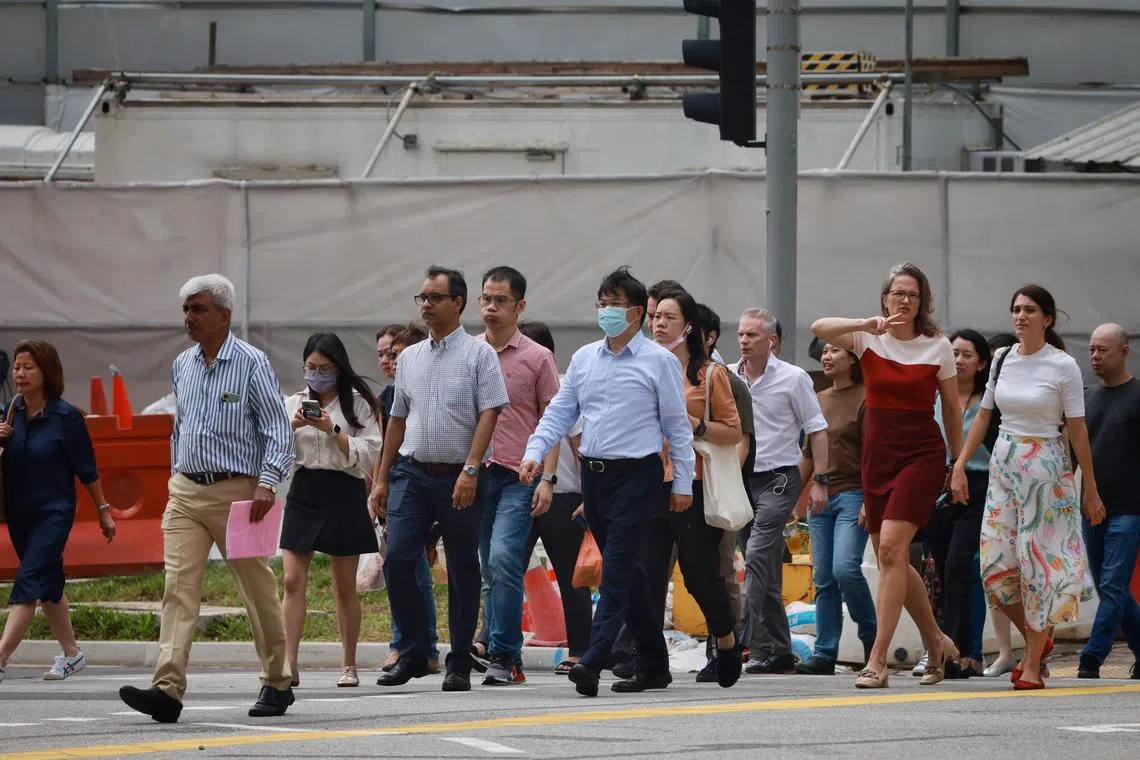2023 labour moves a springboard for recovery
Sign up now: Get ST's newsletters delivered to your inbox

The Straits Times looks ahead at changes likely to shake up Singapore’s labour market, for both Singaporeans and foreigners, in 2023 and beyond.
ST PHOTO: JASON QUAH
SINGAPORE - Out of the Covid-19 pandemic and into a global economic uncertainty and a looming recession, economies worldwide hunger for workers who can hasten their return to stability.
Singapore is no exception, with a slew of labour policies announced that are set to reshape the Republic’s workforce in 2023 and beyond:
Broader and deeper Progressive Wage Model
From March 1, 2023, the Progressive Wage Model will be expanded
Lower-wage workers in the waste management sector will also come under the model. This model sets out a clear pathway for wages to rise along with training and improvements in productivity, and it takes effect from July 1.
With this, the model will cover more than eight in 10 lower-wage local workers, enabling wage climbs that narrow the income gap.
The moves will cap a gradual expansion of the scheme in the making since August 2021, after Prime Minister Lee Hsien Loong announced at the National Day Rally that the Government would accept all the recommendations by the Tripartite Workgroup on Lower-Wage Workers.
To help businesses cope with a heftier payroll, Finance Minister Lawrence Wong announced in his 2022 Budget speech the five-year Progressive Wage Credit Scheme,
Overseas Networks and Expertise (One) pass
From Jan 1, 2023, top foreign talent earning a monthly base salary of $30,000 or more from a single employer, or with outstanding achievements in arts and culture, sports, science and technology, or academia and research, may apply for the Overseas Networks and Expertise (One) Pass.
The new pass, unveiled by Minister for Manpower Tan See Leng in August, is meant for talent comparable to the top 5 per cent of the Republic’s Employment Pass (EP) holders, who number around 8,000 individuals.
One Pass holders may concurrently start, operate and work for multiple companies in Singapore at any one time, unlike the typical EP, which is tied to the specific job of the pass holder.
The new pass is valid for five years, longer than the typical EP, which lasts two to three years.
Moreover, One Pass holders can sponsor dependants, and their spouses will be allowed to work upon obtaining a Letter of Consent.
The pass should be seen as part of a broader set of policies that ensure Singapore’s workforce remains competitive, Dr Tan said in Parliament on Sept 12.
Complementarity Assessment (Compass) framework
Compass, a points-based framework
All new EP applications made from Sept 1, 2023, will be evaluated through Compass, before the framework is extended to renewals a year later.
Under Compass, four “foundational” criteria are used to assess an application. They are an individual’s salary and qualifications, as well as the firm’s workforce diversity and support for local employment.
For each criterion, 20 points are awarded to applications that exceed expectations, 10 points to those that meet expectations, and zero points for those that do not meet expectations.
Bonus points are given to jobs where there is a lack of skilled workers, such as artificial intelligence developers and cyber-security specialists, and firms that partner the Government on ambitious innovation and internationalisation activities.
To pass the evaluation, which is designed to provide firms with greater clarity and certainty for manpower planning, the application needs to rack up 40 points.
Manpower for Strategic Economic Priorities (M-SEP) scheme
Since Dec 13, firms that significantly advance Singapore’s key economic priorities have been allowed to temporarily hire a few more foreign workers than permitted by the prevailing quotas for their industry, under the M-SEP scheme.
This is to ensure that such companies’ efforts to keep Singapore competitive are not derailed by manpower shortages.
Approved firms’ quotas for foreign workers on either the S Pass or work permit will be expanded by up to 5 per cent of their existing base workforce, capped at 50 additional workers, for two years at a time. This quota can be renewed.
To ensure that Singaporean workers share in the progress M-SEP hopes to enable, a firm applying to tap M-SEP must commit to hire, or send for training, within two years the same number of locals as the additional hires it seeks – with limited exceptions for industry leaders who fill critical skill gaps and benefit their sectors.
Work permit and S Pass tweaks
From September 2023, the minimum qualifying salary for S Pass renewals will see the first of three increases
This increase is pegged to what the top one-third of local associate professionals and technicians earn.
As part of moves to help employers adjust to the higher quality benchmark for S Pass workers, manual workers who now hold S Passes instead of work permits – because of restrictions on their country of origin for roles in services and manufacturing – would be allowed to hold work permits if they work in seven selected occupations.
This means manual workers from Bangladesh, India, Myanmar, the Philippines, Sri Lanka and Thailand in those seven occupations will be able to hold a work permit, instead of an S Pass, as is currently required of them.
One of the seven occupations on the list is cooks in Indian restaurants.
The other occupations are food processing workers, such as condiment and sauce makers in food processing firms; sheet metal workers; welders and flame cutters; metal moulders and coremakers; riggers and cable splicers; and structural metal preparers and erectors.


